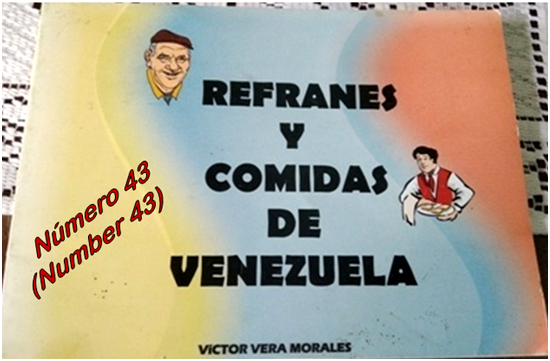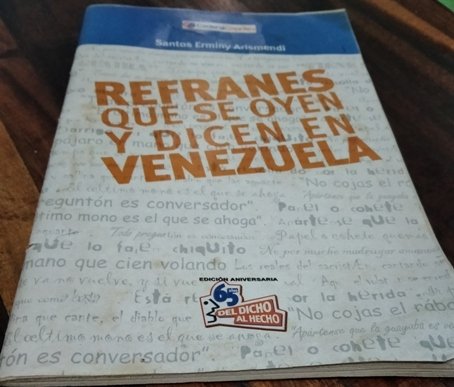

Hoy vamos a reseñar refranes de animales, es decir, que en cada refrán sale un animal; y este, con el que comenzamos es muy común, ya que se usa para indicar que algo (negocio, situación, relación), no tiene energía, carece de entusiasmo, o para referirse a que una comida o bebida que deberían comerse o tomarse calientes, pero están muy frías. Esto se dice, pues por lo general, las lenguas de los perros son de baja temperatura, ya que por allí ellos, (los perros), sudan y regulan su temperatura. Se emplea a manera de símil.
Es un refrán muy difundido en Venezuela, y con él se aconseja la discreción, el no hablar de asuntos que no nos conciernen, porque podríamos meternos en problemas. Podría resumirse en una sola palabra el mensaje implícito en este dicho: Prudencia.
Cuando hay grupos de monos en las selvas y zonas boscosas, y éstos tienen que atravesar un río, un cauce de agua; se forman en fila y se agarran de las colas. Ya estando formados en una hilera, se balancean de un árbol para tomar impulso y lanzarse y alcanzar la otra orilla. Cuando hacen este movimiento, algunos de ellos caen al agua, pero son halados por sus compañeros para que alcancen tierra firme; sin embargo, durante este proceso el último mono es el que tiene una mayor probabilidad de morir ahogado, pues será auxiliado de último. Entonces, con este refrán se trata de decir, que no se quiere estar de último en algún evento o circunstancia, pues hay riesgo de pérdida.
Se utiliza este refrán para indicar que cada quien tiene que ser responsable de las consecuencias de sus actos. También se emplea para indicar que se desea mantener el margen con respecto a una situación, el deseo de no querer inmiscuirse en asuntos ajenos.
Los burros generalmente temen al agua, por lo que al ser embarcados, asumen una actitud estoica, de absoluta seriedad; por tanto, al usar este refrán, se trata de decir que una persona está muy seria, con la cara de pocos amigos.



Today we are going to review animal sayings, that is, in each saying there is an animal; and this one, with which we started, is very common, since it is used to indicate that something (business, situation, relationship), has no energy, lacks enthusiasm, or to refer to a food or drink that should be eaten or drunk hot but they are very cold. This is said, because in general, the tongues of dogs are of low temperature, since there they (dogs) sweat and regulate their temperature. It is used as a simile.
It is a very widespread saying in Venezuela, and with it discretion is advised, not to talk about matters that do not concern us, because we could get into trouble. The implicit message in this saying could be summed up in a single word: Prudence.
When there are groups of monkeys in the jungles and wooded areas, and they have to cross a river, a watercourse; They line up and hold on to each other's tails. Already being formed in a line, they swing from a tree to gain momentum and launch themselves and reach the other shore. When they make this movement, some of them fall into the water, but are pulled by their companions so that they reach dry land; however, during this process the last monkey is the one with the highest probability of drowning, since it will be helped last. So, with this saying it is about saying that you do not want to be last in any event or circumstance, because there is a risk of loss.
This saying is used to indicate that everyone has to be responsible for the consequences of their actions. It is also used to indicate that you want to keep the margin with respect to a situation, the desire not to want to interfere in other people's affairs.
Donkeys generally fear water, so when they are boarded, they assume a stoic attitude, of absolute seriousness; therefore, when using this proverb, it is about saying that a person is very serious, with the face of few friends.
.png)
Dear readers, below I place the links of the first 42 posts, in case you want to read them:
Víctor Vera Morales. (Agosto 2004). Refranes y Comidas de Venezuela. Editado por el Instituto Municipal de Publicaciones de la Alcaldía de Caracas.
Santos Erminy Arismendi. (2006). Refranes que se oyen y dicen en Venezuela. Cadena Capriles, Caracas. Venezuela.
- Fotos de mi autoría, tomada con un teléfono REDMI 8A, intervenida con WordArt / Photos of my authorship, taken with a REDMI 8A telephone, intervened with WordArt.
- Los diseños incluidos en esta publicación, han sido elaborados por mi persona con la aplicación CANVA / The designs included in this publication has been made by me with the CANVA application.
In the event that it is required to use the content or images of this post and my other publications, I would be grateful if my authorship (Fabiola Martínez) was made and the corresponding link was cited. Thank you.

 Delegations welcome!
Delegations welcome!

I feel like we don't hear many sayings like this any more. I wonder if this is why so many don't seem know how to keep to their own business and not judge others.
@tipu curate 2
Hi @minismallholding! I believe that many people have lost some of their common sense and coherence, and it may be part of this, that they are losing the customs and knowledge of such important things as sayings. Thanks for reading my post and for your support. Greetings.
Upvoted 👌 (Mana: 24/44) Liquid rewards.
Imagínate soy venezolana y el único refrán que conocía era el número uno, excelente gracias por compartir😉
Pues me alegro que te haya gustado. Puedes ver muchos más refranes venezolanos en los otros enlaces. Gracias por tu visita y comentario. Saludos.
😉
Hola @sirenahippie, los refranes de esta edición están buenísimos,el único que conozco es el número 2, el de los monos es bien gracioso ja ja, a nadie le gusta quedar de último y si es hacer cola para comprar menos, porque cuando estas cerca de la caja se acaba el producto y quedas como el mono 😭.
Hay un refrán, de animales "Está como caimán en boca de charco" se refiere a las personas que andan a la expectativa buscando ofertas o la oportunidad de sacar beneficio de cualquier situación, son tan ágiles que se colean ja ja y cuando reaccionas ya están instaladisimos y muy serios en la cola, como si nada.
Feliz día!
Hola @belkyscabrera, gracias por la visita a mi blog. Sí, hay miles de refranes, algunos crueles, otros graciosos, otros profundamente sabios. Ese del caimán "Como caimán en boca de caño" , lo saqué en una edición previa, en la número tres sino me equivoco, y es muy cierto, aplicable en muchas situaciones de la vida actual, tal como indicas en la cola de la compra; la cuestión es que esa viveza, tarde o temprano, les saldrá cara a esos caimanes. Saludos.